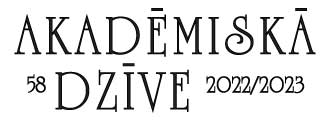Ēdiens kā sociālo pārmaiņu liecinieks dzīvesstāstos un jaunākajā latviešu prozā (20. gadsimta 80./90. gadu mija)
DOI:
https://doi.org/10.22364/adz.58.07Keywords:
pārtikas nepieejamība, jauni produkti, atmiņas, gastronomiskās pieredzes, gastropoētikaAbstract
Ēdiens ir sociālo pārmaiņu marķieris. Proza par jauno gastronomisko pieredzi ironizē un sakāpina to līdz hiperbolai, bet ēdienu izvēles lietišķais apraksts tuvojas dzīvesstāstam
References
Bela-Krūmiņa, B. (2004) Dzīvesstāsti kā sociāli vēstījumi. Promocijas darbs. Rīga: Latvijas Universitāte.
Bugavičute-Pēce, R. (2019) Puika, kurš redzēja tumsā. Rīga: Latvijas Mediji.
Caldwell, M. L. (2002) The taste of nationalism: food politics in postsocialist Moscow. Ethno.
Caldwell, M. L. (2009) Food and Everyday Life in the Postsocialist World. Indiana University Press.
Counihan, C.; Van Esterik, P. (2013) Food and Culture: A Reader. New York: Routledge.
Fieldhouse, P. (1995) Food and nutrition: customs and culture. London: Chapman & Hall.
Garine, I. de (1976) Food, Tradition and Prestige. Walcher, D. N.; Kretchmer, N.; Barnett, H. L. (eds.) Food, Man and Society. New York: Plenum Press, 150–173.
Holtzman, J. D. (2006) Food and Memory. Annual Review of Anthropology, 35, 361–378.
Jones, M. (2007) Food Choice, Symbolism, and Identity: Bread-and-Butter Issues for Folkloristics and Nutrition Studies. The Journal of American Folklore, 120 (476), 129–177.
Jundze, A. (2012) Gardo vistiņu nedēļa: Septiņi bandītu laika stāstiņi. Rīga: Zvaigzne ABC.
Jundze, A. (2017) Sarkanais dzīvsudrabs. Rīga: Dienas Grāmata.
Jung, Y. (2015) Experiencing the “West” through the “East” in the Margins of Europe: Chinese Food Consumption Practices in Postsocialist Bulgaria. Food, Culture and Society, 15 (4), 579–598.
Krūmiņš, G. (2017) Latvijas tautsaimniecības vēsture. Rīga: Jumava.
Kuzmins, S. (2019) Hohma. Rīga: Dienas Grāmata.
Long, L. M. (1998) Culinary Tourism: A Folkloristic Perspective on Eating and Otherness. Southern Folklore, 55 (3), 181–204.
Ma, G. (2015) Food, eating behavior, and culture in Chinese society. Journal of Ethnic Foods, 2, 195–199.
Manfelde, A. (2017) Virsnieku sievas. Rīga: Dienas Grāmata.
Masterovoy, A. (2013) Eating Soviet: Food and Culture in the USSR, 1917–1991. PhD dissertation. New York: City University of New York.
Neuman, N. (2019) On the engagement with social theory in food studies: cultural symbols and social practices. Food, Culture and Society, 22 (1), 78–94.
Popluga, D.; Melece, L. (2009) Trends in Food Expenditure, Consumption and Nutrition in Latvia. LLU Raksti, 22 (317), 43–52.
Pranka, M. (2015) Biogrāfiskā pieeja biogrāfiskā pārrāvuma individuālo un sociālo aspektu analīzē. Promocijas darbs. Rīga: Rīgas Stradiņa universitāte.
Skultans, V. (2022) Anthropological perspectives on alcohol and masculinity in post-Soviet Latvia. Irish Journal of Psychological Medicine, 39 (2), 148–154.
Strauss-Clay, J. (1981) Immortal and ageless forever. The Classical Journal, 112–117.
Zirnīte, M. (2005) Mutvārdu vēstures perspektīva. Latvijas Zinātņu Akadēmijas Vēstis, A daļa, 5 (59), 12–22.
Zvidrins, P. (1998) Changes in Living Standards and Depopulation in Latvia in the 1990s. Social Indicators Research, 43, 121–140.
Želve, K. (2012) Meitene, kas nogrieza man matus. Rīga: Mansards.


